Drink Rosé Whenever You Want
“Yet the prejudice — what else can one call it? — endures. In a Twitter post last week, Lockhart Steele, the founder of Eater.com and other Web sites, suggested that few excuses were acceptable for drinking rosé in January. Well, excuse me, Mr. Steele, you’ve obviously never tried a wine like Jean-Paul Brun’s 2009 Rosé d’ Folie, a minerally pink Beaujolais that I would drink any time of the year, especially if I had a plate of chicken roasted with garlic, rosemary and thyme.”
— Times wine writer Eric Asimov strikes a blow for rosé equality while calling out the questionable taste and experience of some local foodblogger, whose unsophisticated palate and hidebound devotion to slavish cultural dicta is indicative of the conformity and ignorance exhibited by so many of our foodie elite these days.
Britain Gets Its Shot At Outcrassing The US
Britain Gets Its Shot At Outcrassing The US

“It’s fantastic that the UK is going to be the first international MTV territory to take inspiration from the cultural phenomenon that is Jersey Shore and reimagine it for a UK audience.”
— Knifecrime Island is finally on the receiving end of our trash, rather than the other way around, as MTV Networks UK & Ireland announces plans for “Geordie Shore,” a reality show set in Newcastle and based on the sophisticated American anthropological experiment that is “Jersey Shore.” Casting should be a snap; reports out of Britain’s National Health Service show that the “number of young drinkers ending up in hospital with a serious liver problem has risen by more than 50% in the last decade,” a “generational shift” that doctors blame on binge drinking among the young. (Hear the tragic tale of Rich, a 19-year-old who bruised his liver, here.) Experts predict that the stateside phrase “GTL” will be revised for Britain to stand for “glass, throw up, lacerate.”
Photo by jamesjin, from Flickr.
"The Black People, as a Class, Have No Thought For the Future" -- 1874, the 'Times'
Sometimes, when I am eminently bored, I like to scour the New York Times archives for racial slurs. This weekend, hungover and manageably nauseous in a trendy Silver Lake coffee shop, the search term was “nigger,” and I came across my greatest find yet: “’Nigger Day’ In a Country Town.”
“Nigger Day” was originally published on November 30, 1874, nine years after the end of the Civil War, and the reporter’s name is listed only as “Our Own Correspondent.” In circa 4,000 words, the article depicts the pastoral charm of a day in Huntsville, Alabama, right in the middle of Reconstruction, when black sharecroppers would come in from far-flung rural areas to sell their goods and shop in the chic Huntsville boutiques.
The whites of Huntsville, still ashamed of their licking by the Yankees, were ambivalent: On the one hand, they detested the newly freed blacks; on the other, times were tough, and black money was still money. And so Saturdays became Nigger Day in Huntsville, the one day a week when the city’s whites would put on their stiff upper lips and deign to open their doors to blacks.
If America’s relationship with its black population is a plane crash — James Baldwin theorized in a 1966 essay that “the Negro-in-America is increasingly the central problem in American life” — “Nigger Day” should be considered a sort of black box, a reminder of how calculated and insidious the variety of attention paid to American blacks was, even as this post-slavery segregation was about to be codified into the Jim Crow laws that would blanket the South.
I love this article for many reasons — not least because I love history! — but primarily because, in a few simple, condescending paragraphs, it highlights pretty much every single problem that will burden American race relations 137 years into the future, as if the author were some snooty Nostradamus.
The introduction.
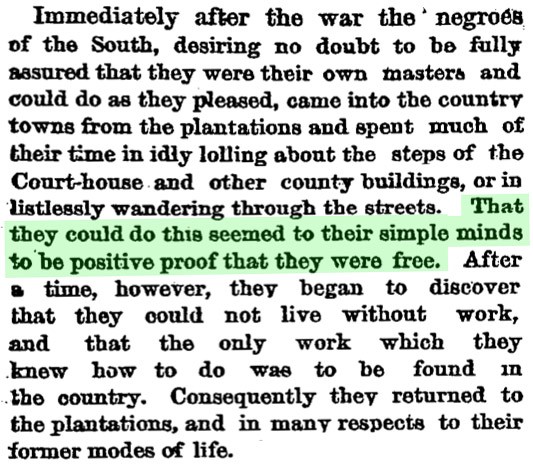
Black people can’t think about the future.
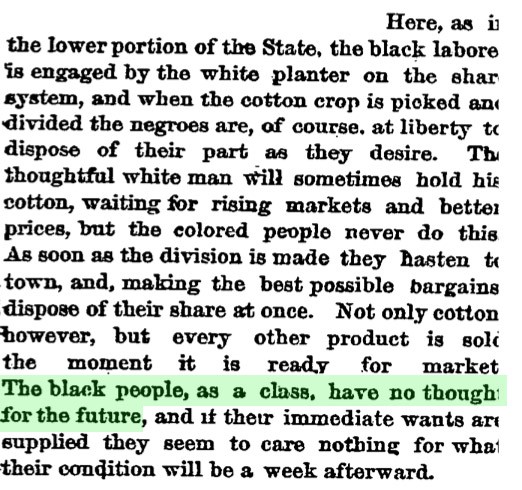
It’s useless to argue with black people, they are so devoted to their “folly.”
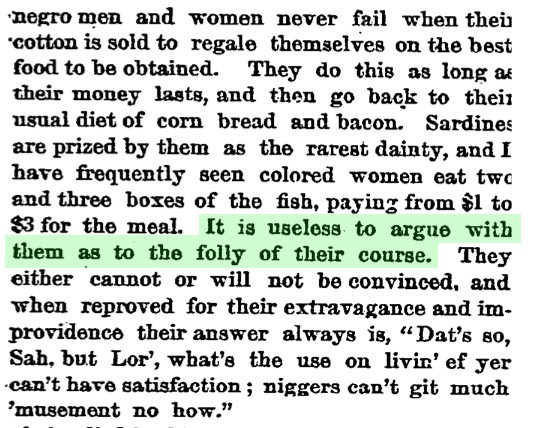
Credit and debt.
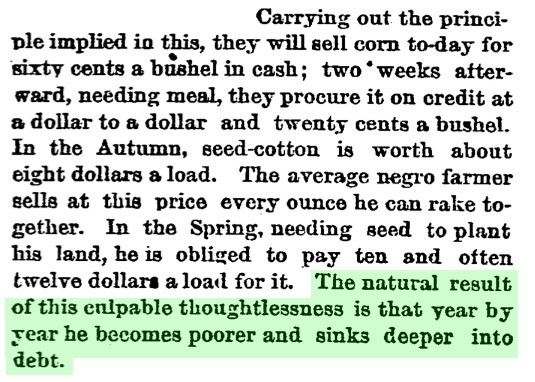
“Country blacks” hate “city blacks.”
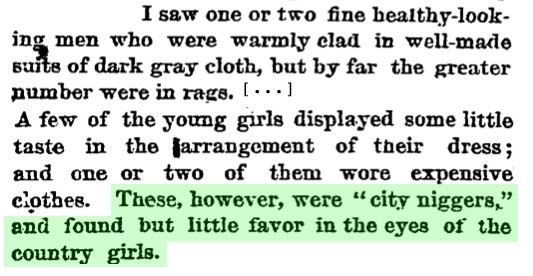
An “amusing incident” involving a “little Jew” and his moneylending, the credit system and how all black people look alike.
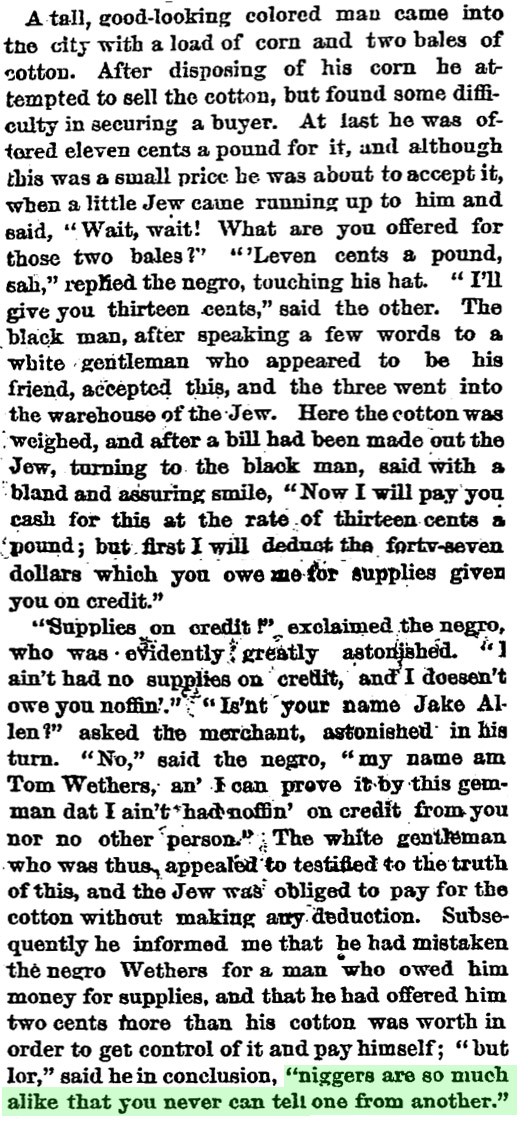
A “knotty” question of fractions.
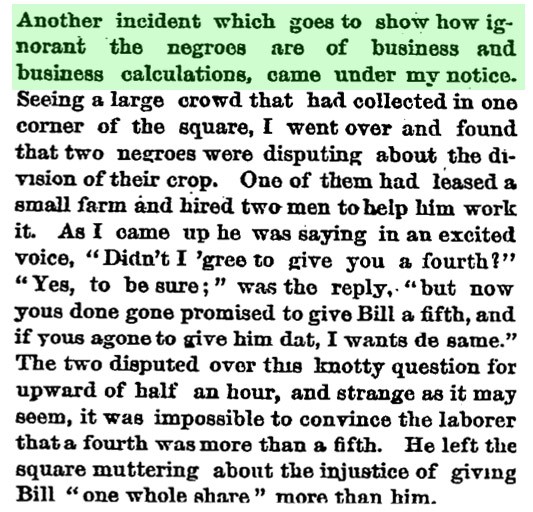
The horrible, gorgeous temptation of the much-hated mulattos (who rightfully spurn “black” men) and undoubtedly know how to “sin.”
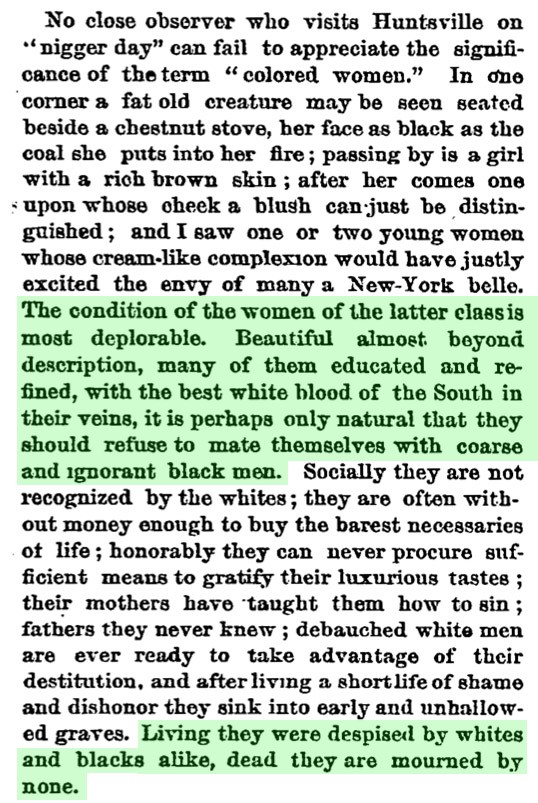
East Coast media elites have a special hatred for boorish redneck whites (who tend to lie about being able to speak French).

The white man gets over on the Negro with whiskey.
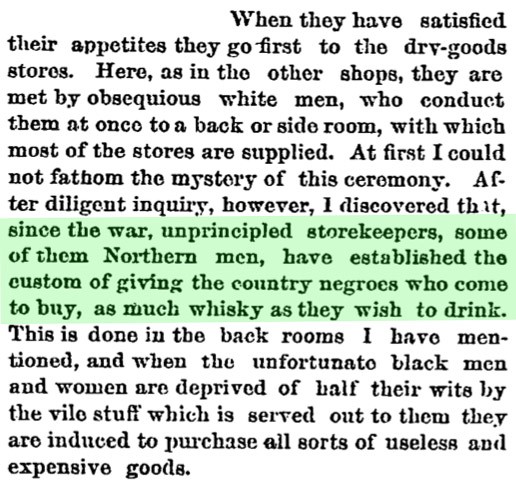
Black women just can’t stop shopping.
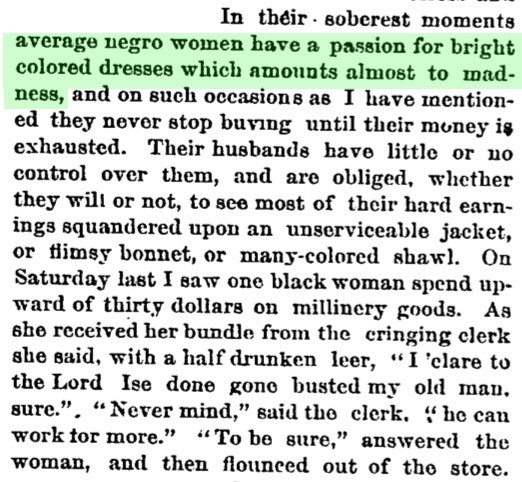
His children will starve but he’ll have a fancy ride and an expensive drink.
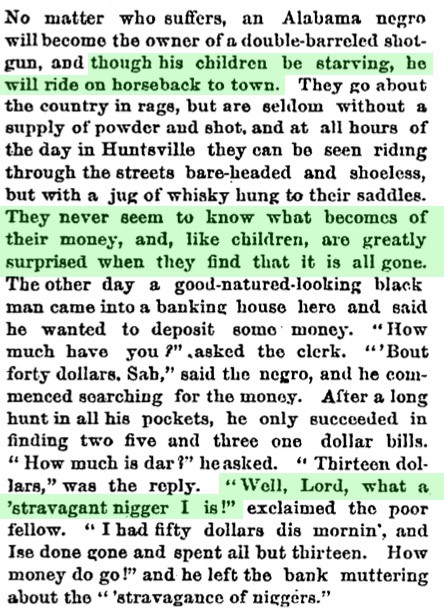
Black men conspire to cheat other black men.
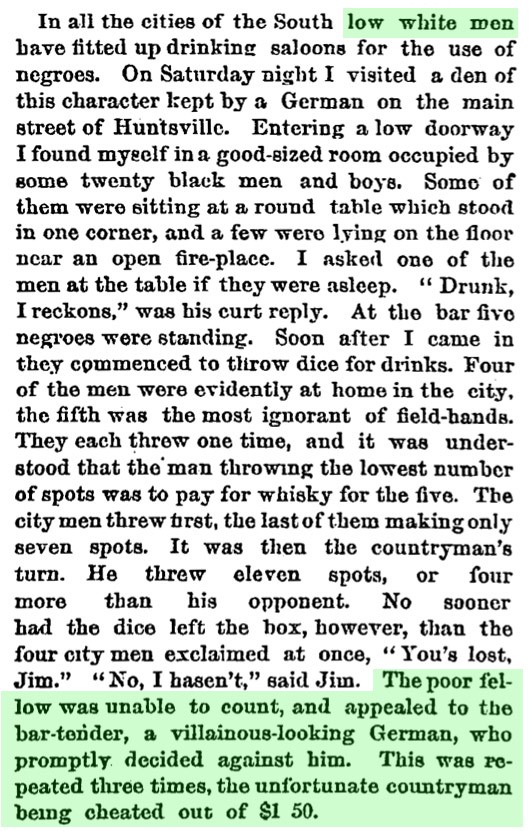
This account ends on a very intentional down note: “…I left the saloon. Just before 12 o’clock I passed it again. Other negroes were throwing dice and playing billiards; three or four women stood among the men at the bar; the number of drunken wretches on the floor had been increased, and one unfortunate creature was lying asleep on the wet and dirty door-step.” Poor creatures and wretches!
Cord Jefferson writes for The Root, Wonkette and The American Prospect.
Gucci Mane And Rocko, "Birds Of A Feather"
Don’t be distracted by the famous (and recently further embellished?) ice-cream cone tattoo. Or the ridiculous jiggling of strippers’ behinds — which are, in case your boss might not like to watching them at work, very close to being naked. (“Brrr” is right!) Focus instead on the way Gucci Mane rides this slinky synth beat, and the lilt of his voice when he pronounces “Captain Crunch.” This is what makes him great.
Preppers Keep On Steppin'

“Being a prepper means that you need to have the ability to handle lots of hiccups in our daily lives. It could be just a school closing on the day you absolutely have to be at work. It could be a blown light bulb in the lamp you need to do some work with. We make a quick phone call to one of your trusted friends that are part of our mutual support group and drop the child off on the way to work or we open the closest and pull out a spare bulb and keep on steppin’. The thing is, of course, that it takes planning and work to be able to do that. You have to be friends with folks to develop a network of support and you have to plan ahead and buy extra items for those quick repairs. Those are the nails as it were. Being a prepper isn’t always an ammo can full of bullets and a pantry full of canned goods, although that is part of it. What about a supply of spices to cook and bake with? Spare everythings are important if they are no longer available at the store.”
— Preppies wear duck boots. Preppers, like Wolverine, make sure to use enough nails while fixing horseshoes to the feet of their steeds — and always keep plenty of spare everythings on hand.
The Marriage Metaphor
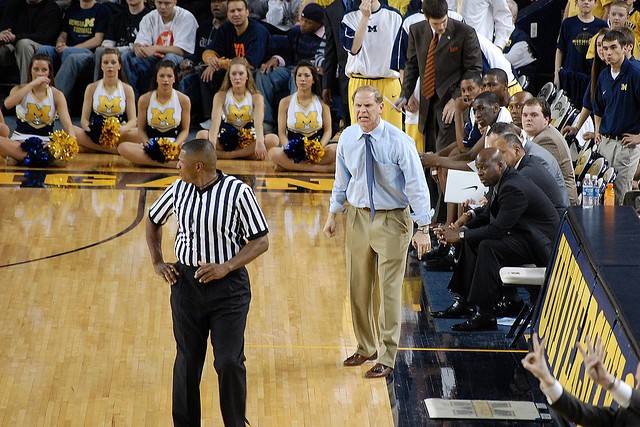
Usually, the only times you hear the word “marriage” intertwined with sports are when some meathead’s boorish behavior becomes front page news or in reference to the special relationship between a player/coach and his school/city. For example, “Ben Roethlisberger and the working class enclave of Pittsburgh are a perfect marriage.” Or, alternately, “The marriage of Latrell Sprewell’s fiery personality and hard-driving head coach PJ Carlesimo was doomed from the start.” Etcetera.
Speaking of choking, most of us of a certain age have experienced the throat-clearing discomfort of attending the wedding of two people everyone is confident should not be getting married, at least not to each other. That they aren’t likely to beat each other up or anything is of lesser importance. They will make each other miserable. You know it, their families know it, God probably knows it. Only they choose not to see it for reasons of ignorance and/or willfulness.
But with very few exceptions, no one will actually do much to stop two consenting, incompatible adults from making this colossal mistake. What can you do, really? Nothing, from the outside. Perhaps if you are close enough friends with one of the pair you can be involved in the early deliberations. But once things are in motion, beyond bitching behind their backs, there’s nothing anyone not them can do. It’s up to each person to make his own choices about who works for him or not, about who can make her life a better one, a more fulfilling one, an easier one, a more successful one. The rest of us just provide running commentary.
Because, in truth, it’s only the select few who can look back at the end of a long life together and say, “This was a marriage that worked.” For those who remain together and who are not previously divorced or living all-but-divorced lives, there is a good chance the relationship at some point morphed into more of a contract, one involving mutual trust, cooperation, some success, plenty of failure, times of mercy and times of betrayal; All of it based on an inexact mixing of selfless-/fish-ness, ambivalence, faith and passion.
In sports, as in life, there often seem to be as many unhappy or purely functional marriages as there are happy ones. Particularly in regards to college programs suffering long downturns, the bonds of matrimony appear often to be tenuous everywhere except where they probably should be. Take the Michigan Wolverines.
The Michigan men’s basketball program won a national title in 1989. The program has also finished second four times (only two of those still official, of course), and has made, all together, six Final Four appearances over the 94 years of the program’s existence. Along the way, too, have come some of NCAA basketball’s all-time great players — Cazzie Russell, Rickey Green, Gary Grant, Glen Rice, Chris Webber, Jalen Rose, to name a few. Michigan basketball has as rich a tradition as all but a handful of basketball programs around the nation.
So why, then, has Michigan settled for mediocrity for so long now? Current head coach John Beilein seemed like an odd choice even back in 2007, when the school was looking to replace the underwhelming former Dukie Tommy Amaker. Beilein is by all accounts one of the game’s nice guys, and as a head coach he had produced unlikely winners at Canisius, Richmond and West Virginia. But relying primarily on an unconventional motion offense and a quirky 1–3–1 halfcourt zone defense, Beilein is a classic coach’s coach — meaning he’s an Xs and Os guy more than your recruiting CEO. Those coach’s coaches? You’d be amazed how few of them reach the next level.
At the time of his hire, Beilein had made West Virginia into a regular Big East contender, and he got the Mountaineers within a few made field goals of the 2005 Final Four. But as with most coach’s coaches, he’d done so primarily by making misfits and oddballs into winners, not by bringing in A+ talent and coaching it. The results for this particular breed of coach are invariably up-and-down: good seasons followed by mediocre ones, NCAA years by NIT ones. For a program already struggling to turn a corner in the Big Ten, Michigan seemed to be aiming low in nabbing Beilein. It was, in its way, not unlike watching those two friends — both with flaws, each needing something essential the other won’t be capable of giving, both desperate — getting married in front of hundreds of skeptical people.
Unsurprisingly, the results in this case have been strikingly predictable, with Beilein amassing a pedestrian 57–61 record with one NCAA appearance in his four seasons to date. Certainly, there are extenuating circumstances in any evaluation of a coach’s progress, and the Michigan coach is no different. Beilein was not left with much to work with. But after making the school’s first NCAA appearance in 10 years in 2009, the Wolverines are backsliding again. Perhaps more to the point, no one really sees a John Beilein-led Michigan program challenging the big boys anytime soon, do they? At this stage, it has all the earmarks a marriage forever afflicted with lonely dreams of past glory and only the briefest of respites — that fancy-clothes night out once a year for your anniversary. The rest of the year it’s all Hungry Man chicken dinners and reruns of “Night Court.”
Then again, many times troubled matrimony is more a result of unreal expectations than anything. Maybe it’s because a choice was made based on superficiality. Just because the hot new coworker turns you on today doesn’t mean it’ll be that way once the make up, the good lingerie and the sexting have been shelved for a Slanket, curlers and a pack of Virginia Slims.
Just look down in Raleigh, where North Carolina State let boring old Herb Sendek (your Slanket-wearer) walk in favor of new trophy wife Sidney Lowe. With his professional connections, Lowe was essentially brought in to liven things up. Lowe was a reasonable selection for his ties to his alma mater and for recruiting, the idea being that to not only compete with but to surpass nearby nemeses North Carolina and Duke, NC State had to replace what appeared to be a culture of acceptable mediocrity with a new culture of professionalism, all in the package of a star alumnus. But as a coach Lowe is and has been a failure. His NBA coaching career topped out at 23 wins in a season twice, with a career NBA coaching win percentage under 26%. It’s not like they were bringing in Red Auerbach here.
But now, NC State has had to sit back and watch Duke and UNC win the last two national titles and make three Final Fours in the four years … and counting … that Lowe has been in charge.
Yes, the talent level has probably gone up, but Lowe couldn’t win in the NBA with NBA talent. And now he’s having a similarly unimpressive run in the ACC. A Lowe-led Wolfpack team has yet to finish higher than 9th in the ACC, a level Sendek never even fell to. Most importantly, Lowe has yet to coach in an NCAA tournament game, while Sendek coached in five straight before leaving.
I don’t dwell on this to claim that NC State acted overly rashly in parting with Sendek. That wasn’t exactly a marriage for the ages either. But there’s no doubt that Lowe has been a poor replacement. Lowe was given time to get his players in, but he has a team full of them now and their talents are being wasted. Sometimes, you have to see the marriage for what it is and not what you hope it might be someday.
But not all pairings are based on such frills. Indeed, some have all the look of a winner before trouble sets in, whether due to boredom or to outside distraction. Such is the case in Los Angeles, where Ben Howland’s honeymoon at UCLA appears to be over.
Howland turned things around at UCLA, leading the program back to the Final Four three straight seasons from 2006–08. A coaching lifer, Howland had the perfect mate — the only job he claimed he’d ever leave Pittsburgh for. But after getting pounded by Villanova in the 2009 NCAA second round, UCLA has suffered a surprising crisis of confidence, fumbling to a 14–18 record last season and struggling so far this year to beat the Montanas and VCUs of the world.
Howland isn’t in any danger of having his basketball marriage annulled, but he’s definitely not in la-la land anymore. UCLA canned Steve Lavin for much better than losing records. In a watered down and beatable PAC-10, UCLA should be a contender each season, roster turnover be damned. And if it comes to pass that Howland can’t get the job done, it’s Hollywood. They’ll just find a new ingénue to play the part.
Of course, for all this talk of doomed marriages, there are also those cases where the surprise is how wrong everyone is. Two that should, by all accounts, never work well together create a certain harmony that works for them. This is your Rick Pitino at Kentucky ca. 1989 and, they hope down in Athens, Mark Fox at Georgia ca. now scenario.
It’s also what the college hoops punditry and die-hard Indiana fans claim is the case with Tom Crean. I’ve been vocal about not seeing it. It’s true the Hoosiers program was in shambles after Kelvin Sampson’s reign of terrible, but it’s year three and Indiana currently sits at 1–6 in the Big Ten with as many as eight games remaining against ranked conference foes. That lone win? Over Michigan (see above). I understand that it takes time to build “the right way,” but I don’t know. Indiana seems to be happy with and patient with Crean, but how long does it take these days to get back to being relevant in basketball with a roster of entirely your own recruits? Three years? Five? That seems like a lot.
All of this needling isn’t just to pick on a few schools. OK, it is a little. Because we aren’t talking about Tulsa or South Florida or Pepperdine here. The schools I’m talking about have thousands of wins over the years, national titles, scores of All-Americans, legendary coaches. They have tradition. There is no good reason why these programs should be floundering except for poor choices by rotten administrators, their stubbornness and hubris. Athletic Directors don’t get to play God with the big money sports that often because the stakes (and the costs) are so high; so when they do, they are loath to admit mistakes. But if they are willing to be self-critical, ADs can rectify a situation before it gets too far.
That’s just what Kentucky AD Mitch Barnhart did when he relieved Billy Gillispie of his position just two years into a mega-deal (that was, apparently, never consummated). As a coaching hire, Billy Clyde was a disaster, and Barnhart had about a five-minute window to either fix his mistake, or double down and live with the results. In this case, the AD swallowed his pride and went for broke, using Kentucky’s cache and millions of dollars to lure John Calipari from Memphis. The results have been inarguably better for the program, at least in terms of wins, exposure and fan acceptance. There is a hefty risk involved, sure, but the Gillispie marriage was a doomed one.
Nearly all of these major hiring decisions, of course, are done on the fly. Each has its own risks and rewards associated, and the AD’s job is to weigh each and make a call based on best available evidence and a coach’s availability. But excepting the cases where a program is in such shape that there are simply no options except mediocre ones, the outcomes of those big decisions are often baffling.
At the end of the day, there is no escaping the eye test, meaning, quite simply, can you realistically picture in your mind that coach taking these players and winning X? If you’re a Southern Illinois, that means one thing. If you’re a Temple, it means another. And if you’re a Kentucky or UCLA (or Indiana?), it means nothing less than playing for an NCAA title.
Maybe Temple is a good test case, because Temple is in a pickle. The current coach of the Owls is the solid Fran Dunphy , who brought with him from Penn a history of success and of integrity. But he follows a coaching legend in John Chaney, no easy feat. Dunphy has performed ably enough, reaching the NCAA tournament each of the past two seasons and returning Temple to a mostly regular spot in the top 25 of the polls.
But unlike during Chaney’s regime, when Temple was every few years a Final Four contender, Dunphy’s reign doesn’t give off the same vibe. This isn’t to say Dunphy is a bad fit for the job, or that his players won’t overachieve. But using the eye test, can you look at the Temple roster, its results to date, its level of play, its recruiting and see a Final Four anytime in the near future? And if the answer is no, then what is Temple trying to accomplish? Is it to be “not bad” or even “pretty good?” There are certainly places where “not bad” is an improvement. One might argue Temple is past that stage.
The Temple-Dunphy marriage dynamic may be the most instructive, as it represents a choice between being content and being ecstatic. Dunphy may keep the Temple program relevant while never reaching the next level. That may be just fine for Temple. After all, replacing a good thing for the chance of being great didn’t work for NC State. But Temple may find itself in a situation where the good thing isn’t enough, just like lots of marriages once the wedding dishes have a few chips in them. If that’s the case, then it’s decision time.
Wedded bliss isn’t something that just happens, of course. Over time, both sides have to work at it. But there has to be something to work with to work at it with any success. It says here Michigan and NC State don’t have what they need to work it out. UCLA may have it. I remain dubious Indiana does. But like all good marriages, only time and hindsight can really show us who’ll be happy, and who’ll be on marriage number three, still searching for Mr. Right.
Originally from Kentucky, JL Weill now writes from Washington, DC. His take on politics, culture and sports can be found at The New Deterrence and on Twitter.
Photo by Jason McMann, from Flickr.
We Must Live in a World Where Quintin Cheeseborough Exists
Is “Quintin Cheeseborough” a real person!? I suppose this hater of the Los Angeles Times is. Apparently there are hundreds of Cheeseboroughs in the U.S. There’s a Qaiyim R Cheeseborough in Virginia!
Go Ahead, Eat Chia Pet Seeds
Can eating the seeds of the Chia Pet help you lose weight? Probably not. But they will give you a nice green coat of sprouts all over your body, and who doesn’t want that? (Speaking of diets, if you are resolutely not on one, here is some good news: If you can find a grocery store that delivers, you will never need to leave the house again until they bring the crane that pulls your gigantic ass out through a hole in the roof.)
Questions About Heaven
by Jeff Johnson
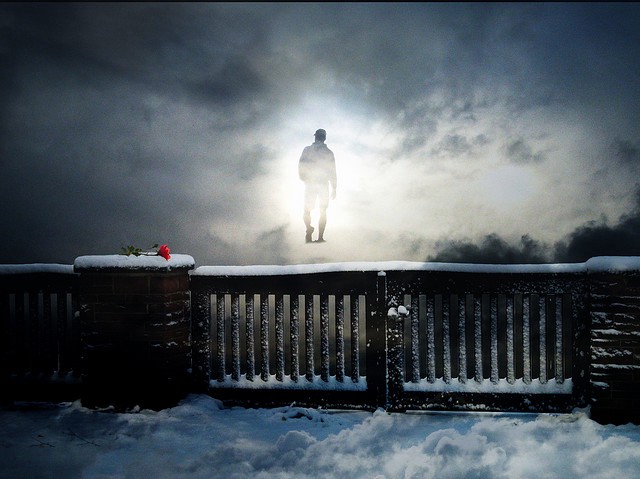
Do you believe in heaven? Will you “make it” up there, one day? Looking down on your loved ones for all of eternity? Do you think looking down on your loved ones for all of eternity sounds like heaven? Does it sound pleasurable? Being able to see what your kids, relatives and friends are up to and not being able to do anything about it? Except for maybe sending them a sign? Do you really believe you could send a “sign” that one of them would understand? Wouldn’t be too cryptic?
Don’t you think that if everyone in heaven could send a sign to someone on earth, it might get sort of chaotic? Or mundane? Wouldn’t a telecommunications company try to start profiting in some way off of this? Could you really cope with not being able to just blurt out, “He has herpes, Louise!” or “Don’t you have a job interview tomorrow? Why are you up smoking pot and watching ‘Law & Order’ reruns, Keith?” or “Watch out for that bus, Gary!” and have it, you know, get to Gary, and save Gary, and not freak Gary’s ass out, or subsequently send him off on some path where he becomes a guru, holding seances in mini-malls? Wouldn’t the worst thing be to send a sign to Gary and then have people think he was crazy? What if he lost his job? Lost his home? Started doing push-ups for pennies in fast-food parking lots while teenagers taunted him? Would you quit with the signs? Or torture him with more?
Could you cope with being in heaven, and being lucid and coherent, but not able to watch over your loved ones still on earth? Wouldn’t you be curious? What else are you going to do with your time? Would you maybe feel sort of “stuck” up there? Wouldn’t that drive you insane? Wouldn’t that be hell? Wondering over and over again how they were doing? And would you be prepared for them just to arrive one-by-one, out of the blue? Could you handle hearing all of their causes of death? “I was beaten by my husband for 40 years,” or “I drowned” or “I fell off a chair lift in Tahoe,” knowing you had been playing 7,562 holes of golf, listening to harp music and chewing on clouds?
Does heaven have the Internet? Are there interesting activities? Do you get to watch Keith Moon and John Bonham participate in a drum-off? What if you got there and had amnesia about all of the things that could potentially worry your soul? Would heaven even feel good? Or would it be just like having Alzheimer’s for eternity? “I don’t know who I am or why I’m here, but I know that nothing bad is happening to me — but not really, since I don’t even know what BAD is! Because I have no frame of reference.” Would that suck more or less than the fears about the people left on earth? Should I just go with the flow? Feel confident in the fact that all of this shit somehow makes sense? That it is coherent in a way we don’t understand? Will never understand? Doesn’t being alive come with enough challenges as it is? Crummy ones? Unresolvable ones?
Will there be animals in heaven? Is there a separate heaven for that? Is heaven “vegan”? Because if you shared heaven with animals and were walking around up there eating a cheeseburger would it not be possible to run into the cow that was turned into that very burger? What would be the proper thing to say? “Thanks for taking one for the team?” What if it was a bacon cheeseburger? And the cow and the pig both were like, “Motherfucker”? And God was like, “They actually have a point, you know”? What if once on earth you went out and got wasted? And you got very hungry? And you didn’t need the calories, but you bought and ate a chicken sandwich? Maybe you even puked it back up later? What if you later happened upon that chicken in heaven? Or its soul? Is this too Safran Foer for you? What if the chicken was like, “I was killed so you could eat me when you were drunk. Nice meeting you. As I recall, you went to the gym the next day because you thought you were fat”? Would that ruin heaven for you? Would you start having to hide in heaven? Would that not suck having to hide from random animals? “I was your pork chop in Hilton Head, ‘97”? What if that didn’t bother you? If you did not give a shit? Surely, someone else would be after you, no? Who would be all, “I see telling on you in the 2nd grade had a positive effect on you. You corrected your behavior. Kudos. Care to go on a walk sometime in the next 1,000 years?”? How would you avoid those fuckers?
Is there garbage in heaven? Plumbing? Charities? Social workers? Do you care? Do you get it? If you would rather die than read one more question, let me ask you this: Will you be going to heaven?
Now that football season is drawing to a close, Jeff Johnson has larger concerns on his mind.
(Last winter it was Popeye. )
Photo by h.koppdelaney, from Flickr.
Woman Defends Judd Apatow
“Here’s the thing: for someone who’s made his name as the poet laureate of twentysomething straight dudes, Apatow actually writes really good parts for women. Don’t get me wrong: Apatow movies are still about men, but, despite the allegations of sexism that have been leveled at him by everyone from Mike White to Katherine Heigl, the women in The 40-Year-Old Virgin, Knocked Up, and Funny People are real people with their own agency — a rare thing in mainstream comedies.”
